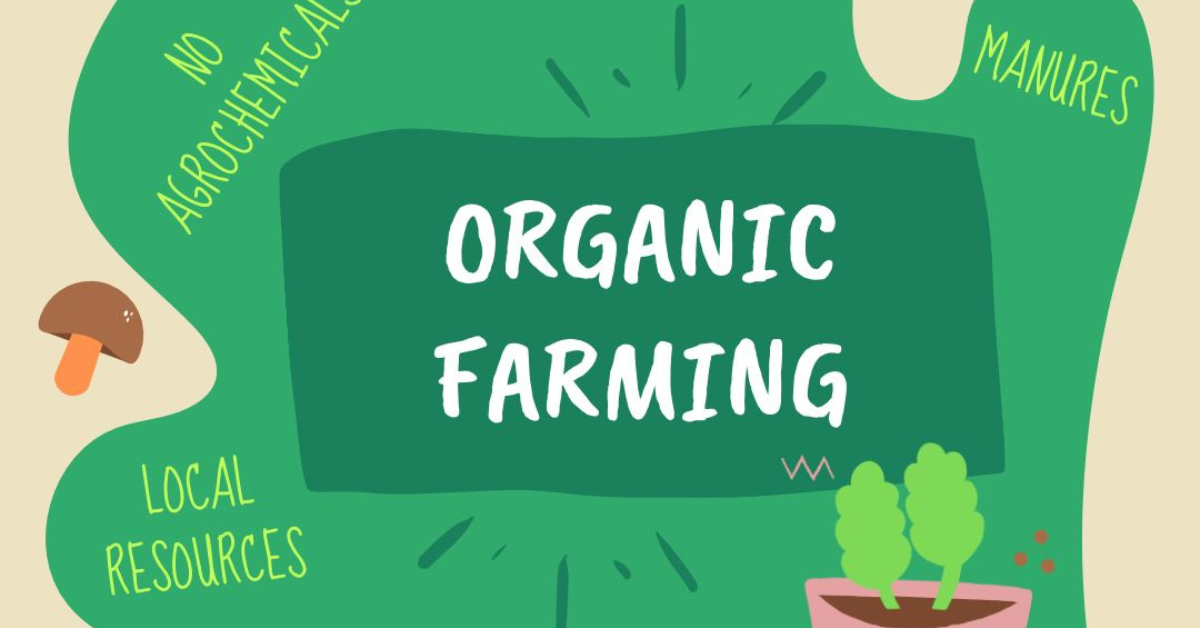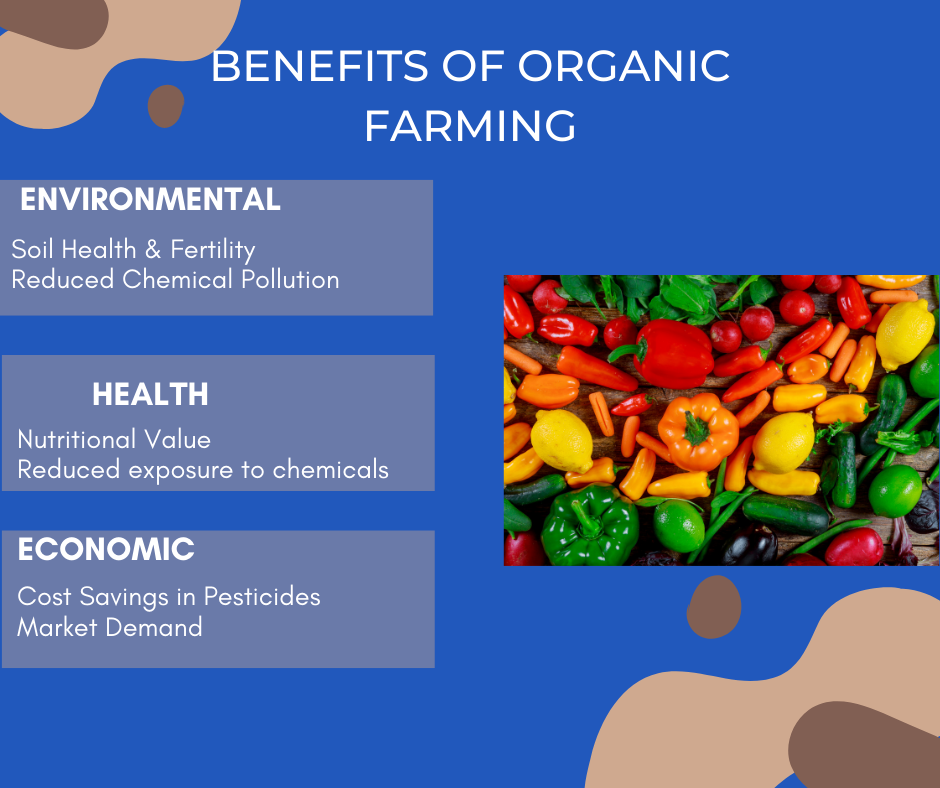Contact: +91 99725 24322 |
Menu
Menu
Quick summary: Discover the key principles and practices of organic farming for sustainable agriculture in our insightful blog. Explore the benefits, techniques, and success stories that showcase how organic farming contributes to a healthier planet and a more sustainable food system. Join the movement towards a greener future.

Conventional farming methods have relied heavily on synthetic pesticides and fertilizers, damaging our soils, ecosystems, and even our health. The need for sustainable agriculture has never been more urgent. With climate change, soil degradation, and dwindling biodiversity threatening food security, farmers face the challenge of producing healthy crops without harming the environment. Organic farming offers a way out, promoting practices that nourish the soil, protect ecosystems, and deliver food that’s free from toxic chemicals.
According to a report by Rodale Institute, organic farming can sequester 3500 pounds of CO2 per acre annually.
Organic farming minimizes soil erosion, maintains water quality, and decreases environmental pollution by eliminating toxic chemicals. Organic farming methods also improve food’s nutritional content, increase animal welfare, and boost the regional economy. Adopting organic farming is essential for a sustainable future since it ensures the planet’s long-term health and the welfare of future generations.
Key Takeaways
An essential component of organic farming is soil management . Crop rotation, cover crops, and composting are among the techniques used by organic farmers to enhance the fertility and health of their soils. These methods improve sustainable agriculture and the long-term productivity of the land by improving soil structure, increasing nutrient content, retaining moisture, and fostering beneficial microbes.
Pest and disease management in organic farming is based on comprehensive and integrated strategies. Crop rotation, intercropping, and the use of resistant plant varieties are tactics used by organic farmers to control and prevent pests and diseases. In order to control pest populations, they also use physical barriers, biological controls like beneficial insects and microbial sprays, and other methods that minimize the need for synthetic pesticides while preserving ecological balance.
Organic farming places a strong emphasis on proactive and long-term weed control strategies. To reduce weed competition with crops, organic farmers use tactics like mulching, hand weeding, and cultivation. To control weeds, they also employ cover crops, smother crops, and appropriate crop spacing. Additionally, hoeing and flame weeding are frequently used to eradicate weeds without the use of synthetic herbicides, encouraging ecological harmony and soil health.
The major goal of nutrient management in organic farming is to keep crops supplied with a balanced and sustainable amount of nutrients. Compost, manure, and cover crops grown with green manure are examples of natural fertilizers that organic farmers employ to replenish the soil’s vital nutrients. Additionally, they use methods like crop rotation, which enhance nutrient availability and lessen nutritional imbalances.
Organic farming and crop residue management are closely linked as both aim to promote soil health and sustainable agricultural practices. In organic farming, crop residues—such as stems, leaves, and husks—are often left on fields or composted to enrich the soil with organic matter. This natural process improves soil fertility, enhances moisture retention, and prevents erosion. By integrating crop residue management, organic farmers reduce the need for synthetic fertilizers, recycle nutrients back into the soil, and promote a healthier, more sustainable farming system. It also helps in managing pests and weeds organically, aligning with the principles of organic farming.
Crop rotation and diversification are essential practices in organic farming. Crop rotation entails alternating various crops over time on the same plot of land. This enhances soil health, breaks disease and pest cycle cycles, and lessens the demand for synthetic inputs. In order to promote biodiversity, strengthen ecosystem resilience, and lower the chance of crop failure due to pests or environmental causes, diversification entails planting a range of crops in a specific area.

Organic farming, sustainable farm management, and agroecology are interconnected approaches that work together to create a holistic, eco-friendly agricultural system. Organic farming eliminates the use of synthetic chemicals, relying on natural methods that enhance soil health and biodiversity. Sustainable farm management builds on this by integrating practices that optimize resource use, reduce environmental impact, and ensure long-term farm productivity. Meanwhile, agroecology goes a step further, focusing on harmonizing farming with natural ecosystems, using biological processes to manage pests, improve soil fertility, and promote crop diversity. Together, these approaches form a resilient, sustainable foundation for modern agriculture.
The distinction between organic and conventional farming lies in their underlying approaches to agriculture. Organic farming embraces a holistic and environmentally friendly ethos, eschewing synthetic chemicals and genetically modified organisms. Instead, it relies on natural methods such as crop rotation, composting, and biological pest control to maintain soil fertility and mitigate pests. Organic farming prioritizes biodiversity and promotes long-term sustainability.
On the other hand, conventional farming employs modern agricultural practices that often involve the use of synthetic fertilizers, pesticides, and genetically modified seeds. While conventional methods may achieve higher yields in the short term, they sometimes raise concerns about environmental impact, soil health, and the potential residue of chemicals in food products.
Ultimately, the choice between organic and conventional farming reflects a balance between sustainable, nature-centric practices and high-efficiency, technology-driven approaches. Each has its merits and considerations, influencing the agricultural landscape and the broader discourse on sustainable food production.
Organic farming stands as a champion for pollinator health providing a sanctuary where bees, butterflies, and other essential pollinators thrive. By abstaining from synthetic pesticides and prioritizing natural alternatives, organic practices create an environment conducive to biodiversity. Organic farms often feature diverse plant species, providing ample forage and habitat for pollinators. This commitment to ecological balance not only safeguards the delicate web of pollinator life but also contributes to the resilience of ecosystems, ensuring the continued pollination of crops for a sustainable and flourishing agricultural landscape.
By receiving an organic certification, businesses can demonstrate that their operations and goods comply with the fundamentals of organic farming. Accredited by regulatory bodies, certification bodies check that farmers adhere to specified organic criteria for inputs, pest control, animal welfare, and soil management. Although these requirements differ by location, they all work to increase transparency, morality, and consumer confidence in organic products. To keep their certification, organic farmers must submit to frequent inspections and keep thorough records.
A framework for organic farming practices across many nations is provided by international organic standards and regulations. Guidelines for organic production, processing, and labeling are set by groups like the Codex Alimentarius Commission and the International Federation of Organic Agriculture Movements (IFOAM). These standards include a wide range of topics, such as labeling requirements, genetic engineering, pest control, and animal welfare. They help to facilitate international trade of organic goods, ensure consumer confidence, and harmonize organic practices around the globe.
Regenerative Organic Certification (ROC) is a pioneering standard that goes beyond traditional organic certification, aiming to elevate agricultural practices to new heights of sustainability. Embracing a holistic approach, ROC integrates three core pillars: soil health, animal welfare, and social fairness. Farms certified under ROC prioritize regenerative practices, emphasizing soil regeneration techniques, ethical treatment of animals, and fair labor practices.
Farm management software plays a crucial role in organic farming by providing tools to track and document every aspect of the farming process. It helps farmers monitor inputs like organic fertilizers and pest control measures, ensuring compliance with organic standards. The software also supports planning and scheduling activities such as crop rotation, soil health management, and harvest timing. With real-time data and detailed records, it streamlines certification processes, enhances transparency, and allows farmers to optimize their organic practices for better productivity and sustainability.
TraceX’s farm management platform is a powerful tool for tracking organic farming practices by providing comprehensive digital solutions that streamline and verify every step of the organic farming process. With its blockchain-based technology, TraceX enables farmers to record and monitor their organic practices in real-time, ensuring compliance with organic standards and certifications. The platform tracks inputs such as organic fertilizers and pest control methods, provides transparent documentation of farming activities, and facilitates easy verification for certification bodies. This not only helps farmers maintain the integrity of their organic practices but also builds trust with consumers by offering a clear, immutable record of how their food is produced, from farm to table.
A foundation leveraged TraceX’s farm management platform to enhance the transparency and quality of organic crop production, benefiting consumers by ensuring they have access to high-quality, authentically organic products. The foundation utilized TraceX’s blockchain-based traceability solution to meticulously track and document every stage of the organic farming process, from seed sourcing to final harvest. This platform enabled the foundation to record and verify the use of approved organic inputs and methods, ensuring compliance with organic certification standards. The platform’s real-time data tracking and verification features ensured that all organic claims were backed by transparent, tamper-proof records. This not only helped maintain high standards for organic farming but also educated consumers about the integrity and safety of their food choices, ultimately promoting a more informed and confident market.
Organic farming is an essential method of agriculture that supports longevity, environmental protection, and the creation of wholesome food. Organic farmers support a more robust and balanced ecosystem by adhering to values including soil health, biodiversity preservation, and avoiding synthetic inputs. Reduced chemical exposure, improved soil quality, improved nutrition, and greater animal welfare are all advantages of organic farming. However, managing pests and diseases, nutrients, weeds, and market access are additional difficulties for organic farming. These difficulties can be overcome with creative approaches and assistance, allowing organic farming to flourish and play a vital part in creating a more resilient and sustainable food system for future generations.
Organic farming focuses on sustainability and environmental stewardship by using practices that promote soil health, biodiversity, and natural pest control. Key principles include avoiding synthetic pesticides and fertilizers, using organic compost and natural pest management methods, rotating crops, and maintaining healthy soil through organic amendments. Organic farming aims to work with nature rather than against it, fostering a balanced and resilient agricultural ecosystem.
Organic farming contributes to sustainability by minimizing the use of harmful chemicals, which reduces soil and water pollution and supports the health of surrounding ecosystems. By promoting practices like crop rotation, cover cropping, and organic composting, organic farming enhances soil fertility and structure. This approach helps build a resilient agricultural system that can withstand environmental stresses, supports biodiversity, and reduces the carbon footprint of food production.
Choosing organic products offers several benefits, including reduced exposure to synthetic pesticides and chemicals, which can be harmful to human health and the environment. Organic farming practices also contribute to better soil health, enhanced biodiversity, and more sustainable water management. Additionally, organic farming supports local economies and often provides higher nutritional value, as organic produce is grown in nutrient-rich soils and without artificial additives.
